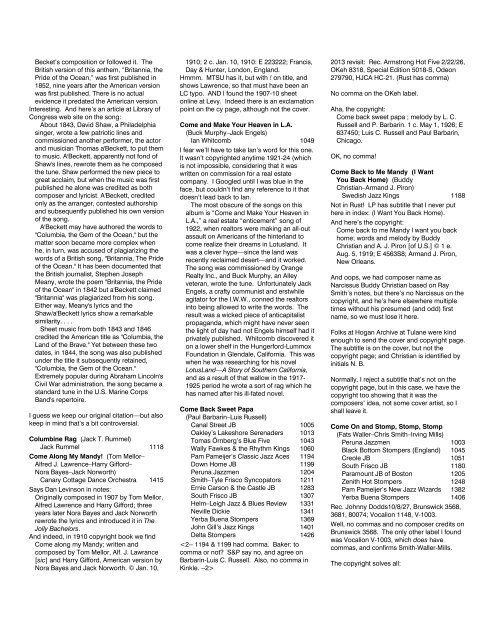Create successful ePaper yourself
Turn your PDF publications into a flip-book with our unique Google optimized e-Paper software.
Becket’s composition or followed it. TheBritish version of this anthem, “Britannia, thePride of the Ocean,” was first published in1852, nine years after the American versionwas first published. There is no actualevidence it predated the American version.Interesting. And here’s an article at Library ofCongress web site on the song:About 1843, David Shaw, a Philadelphiasinger, wrote a few patriotic lines andcommissioned another performer, the actorand musician Thomas a'Beckett, to put themto music. A'Beckett, apparently not fond ofShaw's lines, rewrote them as he composedthe tune. Shaw performed the new piece togreat acclaim, but when the music was firstpublished he alone was credited as bothcomposer and lyricist. A'Beckett, creditedonly as the arranger, contested authorshipand subsequently published his own versionof the song.A'Beckett may have authored the words to"Columbia, the Gem of the Ocean," but thematter soon became more complex whenhe, in turn, was accused of plagiarizing thewords of a British song, "Britannia, The Prideof the Ocean." It has been documented thatthe British journalist, Stephen JosephMeany, wrote the poem "Britannia, the Prideof the Ocean" in 1842 but a'Beckett claimed"Britannia" was plagiarized from his song.Either way, Meany's lyrics and theShaw/a'Beckett lyrics show a remarkablesimilarity. . . .Sheet music from both 1843 and 1846credited the American title as "Columbia, theLand of the Brave." Yet between these twodates, in 1844, the song was also publishedunder the title it subsequently retained,"Columbia, the Gem of the Ocean."Extremely popular during Abraham Lincoln'sCivil War administration, the song became astandard tune in the U.S. Marine CorpsBand's repertoire.I guess we keep our original citation—but alsokeep in mind that’s a bit controversial.Columbine Rag (Jack T. Rummel)Jack Rummel 1118Come Along My Mandy! (Tom Mellor–Alfred J. Lawrence–Harry Gifford–Nora Bayes–Jack Norworth)Canary Cottage Dance Orchestra 1415Says Dan Levinson in notes:Originally composed in 1907 by Tom Mellor,Alfred Lawrence and Harry Gifford; threeyears later Nora Bayes and Jack Norworthrewrote the lyrics and introduced it in TheJolly Bachelors.And indeed, in 1910 copyright book we findCome along my Mandy; written andcomposed by Tom Mellor, Alf. J. Lawrance[sic] and Harry Gifford, American version byNora Bayes and Jack Norworth. © Jan. 10,1910; 2 c. Jan. 10, 1910: E 223222; Francis,Day & Hunter, London, England.Hmmm. MTSU has it, but with ! on title, andshows Lawrence, so that must have been anLC typo. AND I found the 1907-10 sheetonline at Levy. Indeed there is an exclamationpoint on the cy page, although not the cover.Come and Make Your Heaven in L.A.(Buck Murphy–Jack Engels)Ian Whitcomb 1049I fear we’ll have to take Ian’s word for this one.It wasn’t copyrighted anytime 1921-24 (whichis not impossible, considering that it waswritten on commission for a real estatecompany. I Googled until I was blue in theface, but couldn’t find any reference to it thatdoesn’t lead back to Ian.The most obscure of the songs on thisalbum is “Come and Make Your Heaven inL.A.,” a real estate “enticement” song of1922, when realtors were making an all-outassault on Americans of the hinterland tocome realize their dreams in Lotusland. Itwas a clever hype—since the land wasrecently reclaimed desert—and it worked.The song was commissioned by OrangeRealty Inc., and Buck Murphy, an Alleyveteran, wrote the tune. Unfortunately JackEngels, a crafty communist and erstwhileagitator for the I.W.W., conned the realtorsinto being allowed to write the words. Theresult was a wicked piece of anticapitalistpropaganda, which might have never seenthe light of day had not Engels himself had itprivately published. Whitcomb discovered iton a lower shelf in the Hungerford-LummoxFoundation in Glendale, California. This waswhen he was researching for his novelLotusLand—A Story of Southern California,and as a result of that wallow in the 1917-1925 period he wrote a sort of rag which hehas named after his ill-fated novel.Come Back Sweet Papa(Paul Barbarin–Luis Russell)Canal Street JB 1005Oakley’s Lakeshore Serenaders 1013Tomas Örnberg’s Blue Five 1043Wally Fawkes & the Rhythm Kings 1060Pam Pameijer’s Classic Jazz Aces 1194Down Home JB 1199Peruna Jazzmen 1204Smith–Tyle Frisco Syncopators 1211Ernie Carson & the Castle JB 1283South Frisco JB 1307Helm–Leigh Jazz & Blues Review 1331Neville Dickie 1341Yerba Buena <strong>Stomp</strong>ers 1369John Gill’s Jazz Kings 1401Delta <strong>Stomp</strong>ers 14262013 revisit: Rec. Armstrong Hot Five 2/22/26,OKeh 8318, Special Edition 5018-S, Odeon279790, HJCA HC-21. (Rust has comma)No comma on the OKeh label.Aha, the copyright:Come back sweet papa ; melody by L. C.Russell and P. Barbarin. 1 c. May 1, 1926; E637450; Luis C. Russell and Paul Barbarin,Chicago.OK, no comma!Come Back to Me Mandy (I WantYou Back Home) (BuddyChristian–Armand J. Piron)Swedish Jazz Kings 1188Not in Rust! LP has subtitle that I never puthere in index: (I Want You Back Home).And here’s the copyright:Come back to me Mandy I want you backhome; words and melody by BuddyChristian and A. J. Piron [of U.S.] © 1 e.Aug. 5, 1919; E 4563S8; Armand J. Piron,New Orleans.And oops, we had composer name asNarcissus Buddy Christian based on RaySmith’s notes, but there’s no Narcissus on thecopyright, and he’s here elsewhere multipletimes without his presumed (and odd) firstname, so we must lose it here.Folks at Hogan Archive at Tulane were kindenough to send the cover and copyright page.The subtitle is on the cover, but not thecopyright page; and Christian is identified byinitials N. B.Normally, I reject a subtitle that’s not on thecopyright page, but in this case, we have thecopyright too showing that it was thecomposers’ idea, not some cover artist, so Ishall leave it.Come On and <strong>Stomp</strong>, <strong>Stomp</strong>, <strong>Stomp</strong>(Fats Waller–Chris Smith–Irving Mills)Peruna Jazzmen 1003Black Bottom <strong>Stomp</strong>ers (England) 1045Creole JB 1051South Frisco JB 1180Paramount JB of Boston 1205Zenith Hot <strong>Stomp</strong>ers 1248Pam Pameijer’s New Jazz Wizards 1382Yerba Buena <strong>Stomp</strong>ers 1406Rec. Johnny Dodds10/8/27, Brunswick 3568,3681, 80074; Vocalion 1148, V-1003.Well, no commas and no composer credits onBrunswick 3568. The only other label I foundwas Vocalion V-1003, which does havecommas, and confirms Smith-Waller-Mills.The copyright solves all:


